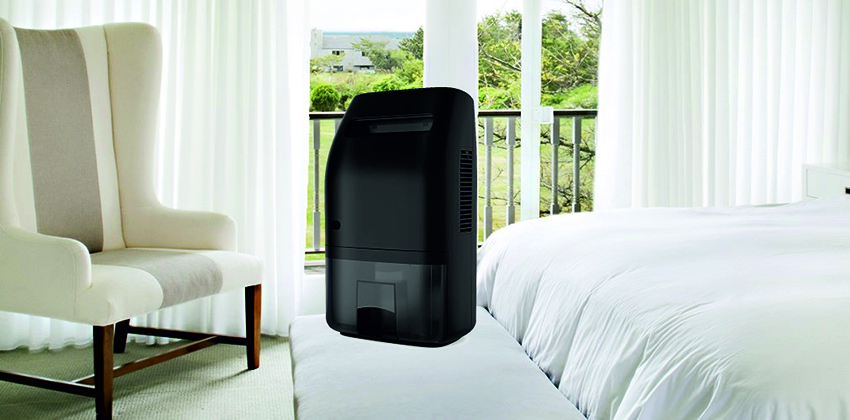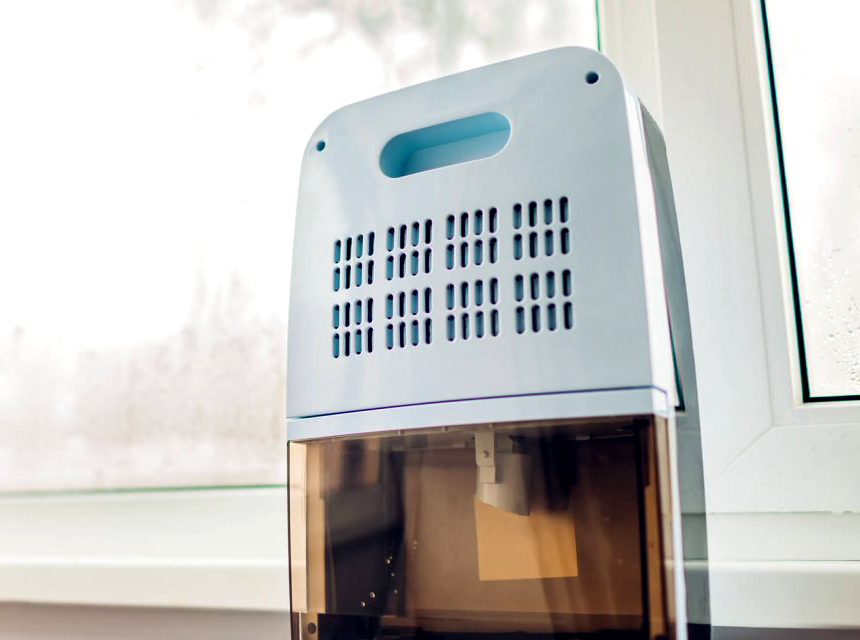

Allergies, water stains on walls and ceilings, musty smells, and frequent condensation on windows are all tell-tale signs of high moisture levels indoors. What you need to combat these and other moisture-related issues, is a good dehumidifier.
There is a fair bit of choice when it comes to getting the right dehumidifier. For instance, there are smaller models suitable for individual rooms, slightly larger ones for open-concept areas such as the basement, and then those that cater to the whole house as well. If you need to, you can even find ones with special features for more unique needs.
To get rid of excess moisture in your household, you’ll need a dehumidifier which will benefit you in plenty of ways, especially if you live a more humid climate with a lot of moisture already in the air. Overall, it can maintain your health, living and air quality, and make your home a more comfortable place. Here are some more specific benefits and reasons you should consider getting a dehumidifier for your home.
Protects your breathing health: Getting rid of that extra moisture in the air makes many areas less prone to developing mold and mildew, which in most cases would be hazardous to your health. Getting rid of the chance for unwanted growths like black mold (which is, in fact, poisonous) lets you rest assured that you’re breathing safer.
People with allergies or breathing conditions like asthma or bronchitis won’t have to worry about airborne mold spores or even dust mites in their basement or home.
Gets rid of musty smells: Moisture-related growths from extra humidity often release gases with a nasty, musty smell that can be absorbed and engrained into nearby fabrics and furniture. The danger of this particular sign is that such smells take time to develop and if you experience this at your home, chances are that moldy and damp growths have been at work for some time now.
A dehumidifier can help get rid of this issue somewhat, but it’s better to get professional services to deal with any hidden mold issues.
Makes your home feel more comfortable: Humidity in the air can really make the room feel hotter than it really is as well as damp and uncomfortable overall. Lowering the level of humidity in the room will prevent the dampening of everything else that the air would come in contact with.
When you pair the use of a dehumidifier with plants that remove moisture from the air, such as Boston ferns, you can improve indoor air quality as well.
Helps lengthens your house’s lifespan: Whether or not you have humidity issues in your home, chances are any sort of unmaintained moisture or condensation is contributing to the slow but steady structural decay of your house. Condensation from cooking, showers, and water heating, if not minimized by a dehumidifier, can lead to faster wood shrinking, rust, damp wall patches, and peeling wallpaper. Getting rid of these issues in the early stages of development can minimize damage and potentially lengthen your house’s structural integrity.
And if these benefits aren’t enough, then know that higher humidity also decreases you home’s energy efficiency. With the inside of your home staying warmer, your HVAC has to work harder to cool it down. So investing in a good dehumidifier can help resolve this issue as well.
So, you want to get a dehumidifier, but you don’t know which of the size and power options to choose from. Before you can decide how to size a dehumidifier, you’ll need to take some measurements and several other factors into consideration. You don’t want one that won’t be powerful enough for the room, because then the dehumidifying job wouldn’t get done properly. You need one that’s just right, and here’s how to find how big of a humidifier you need.
The two main things you need to know to find an appropriately sized dehumidifier are the rooms’ square footage and the room’s moisture levels. Once you know these two aspects, you can better understand and select from the AHAM-standard sizes of units, which is measured in pints of water dried out per day and have been regulated to meet any room’s needs. Most units come with an easy-to-understand sizing chart that follows these standards to help you better choose accordingly.
Measure the area: This part is simple enough. Measure the room’s dimension’s and calculate its 3-dimesional volume.
Get an idea of the room’s moisture levels: This bit requires a hygrometer, which is a tool uses to accurately measure the moisture in the air. With it you can see your current moisture levels (which is measured in percentage) and calculate how much moisture you need to be liquidating in order to reach a more ideal humidity range, which would be about 30% to 50%.
Hygrometers are available as inexpensive analog devices, costlier but more accurate digital devices, or even apps that connect your mobile device to wireless sensors.
Using these factors, you can size your ideal dehumidifier and begin shopping for a unit. There are even online calculators available that use these measurements and recommend a dehumidifier for you.
There are average sizes and measurements, and you can choose from those options based on your room size. For example, for an area of 1000 square feet in a moderately damp setting (60%-70%), the best size dehumidifier you need would have to have a capacity of 60 pints, although do note this would vary depending on other factors.
The temperature of your space: You will need to know the room’s high and low average temperatures so you can find a dehumidifier that will operate properly within that range without issues.
The type of humidifier: There are two different types of humidifiers available that work better depending on the temperature of the external space. Refrigerant dehumidifiers are more suitable for rooms that are generally warm or hot, because of the cold interior systems that meet with the humid air to condensate moisture and collect the water. They are prone to freezing and malfunctioning in colder temperatures, but that’s where the desiccant dehumidifiers come in. They extract water from moist air using absorbent material and work in colder temperatures because they have internal heating systems.
What’s in the room: This type of context is important in deciding whether or not you need to add a few extra pints to the base recommended size. Things like climate, more doors or windows in your space, the number of residents in the space, and the appliances nearby can all add about 5 extra pints each to account for extra moisture collection.
The climate: You should know how humid it gets outside in the are you live, because this will directly affect the humidity levels indoors. If you live in a region more prone to high levels of moisture, consider buying a dehumidifier with a larger capacity as it will be used more and more often, or consider buying a space-efficient permanent basement dehumidifier.
The basement is a part of your house that would need a dehumidifier more than others, as it can get really humid down there. Being underground and often the place where laundry is done, it can become the perfect place for mold and mildew to grow and start triggering allergies. Luckily there are dehumidifier models made specifically for basements to meet their specific, slightly more demanding needs.
The size of dehumidifier you’d need for your basement would, like any other room, depend on the size and humidity of the basement which can be measured and calculated.
It’s not necessary, but better, if you buy a slightly larger dehumidifier for your basement. A dehumidifier with a larger capacity can bring the humidity in the air down to optimal levels with less effort and can handle rooms where more moisture-producing tasks take place.
When you consider the question “What size dehumidifier do I need for my house”, it’s helpful to know that some dehumidifier models work to maintain the humidity of the entire residence. These whole-home units are ideal for consistently humid climates because it works to keep the entire house comfortable and wards off moisture-related damage, even making the air conditioning more efficient.
In the case of a whole-home dehumidification system, it’s best to consult a dealer for a professional point of view. Be sure to measure your house size (in square footage) and know the average humidity in your region.
Finding the right size dehumidifier is an important step in buying the right unit for your household. Accidentally buying one too small can be a weak investment in a device that requires constant operation while hardly getting the job done in improving your air quality. Remember to have no fear: there’s a right dehumidifier for any home in any location, so you can find the right one for yours.





